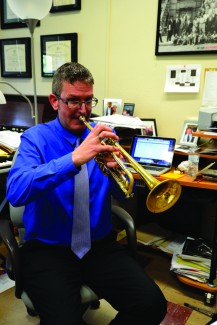Vern Sielert talks about his path through the world of jazz
Vern Sielert started playing his first instrument, the piano, when he was in fourth grade.
He said after listening to his mother play, he decided he wanted to make music. Then he heard his brother play the trombone at his high school band concerts, where Sielert also listened to the school’s jazz band perform. It was then when he realized he wanted to be a part of that world — the world of jazz.

Amelia C. Warden | Rawr
UI Music Professor Vern Sielert plays the trumpet in his office during a meeting with a student. Professor Sielert recently produced the jazz album Clarity with his band Unhinged Sextet.
“I started trumpet in the fifth grade, and haven’t looked back,” Sielert said. “It’s kind of been the main focus of everything I’ve done since then and everywhere I’ve been.”
After high school, Sielert picked up his trumpet and left his home in Connecticut to go to North Texas State University, now known as University of North Texas (UNT), which has one of the oldest jazz studies programs in the country.
Sielert received his undergraduate degrees in jazz performance and music education before going back to UNT for his master’s degree in jazz studies and to play in the six-time Grammy nominated One O’Clock Lab Band, which Sielert said he played in for two years. He said he wrote and recorded music throughout this time, freelanced around Texas for the next five years and taught as an adjunct professor at Baylor University.
Sielert said he enjoyed the idea of running a big band or a jazz program at a college, so the next logical step was to get his doctorate.
“By that time, I had met my wife and she wanted to go get her doctorate too, so we wound up going to the University of Illinois together and got our DMA — a doctorate in musical art is what it’s called,” he said. “We were there for three years, and then we were both applying around for jobs and I got lucky enough to get one at the University of Washington. I taught there for five years in Seattle.”
When two jobs opened up at the Lionel Hampton School of Music at the University of Idaho, Sielert and his wife, Vanessa, jumped on the opportunity to work in the same program.
“We applied and we both got the gigs, luckily, which is kind of really rare for two people in the same line of work,” he said. “Our (focus is) very specific — instrument specific — so for two things to line up and the timing and all that kind of stuff — we feel very fortunate to be in Moscow doing what we do.”
Since then, Sielert has been teaching the young jazz enthusiasts of UI and playing with bands around the Palouse, in Washington and in jazz festivals throughout the country. His latest project was a jazz record Clarity he produced with several of his old colleagues, he said.
“This record is a project with some friends of mine — one of whom I went to school with at North Texas and another one I went to school with at Illinois, so we’ve all known each other for a long time,” Sielert said. “We all wrote music for it and we all met up in Phoenix, which is where two of the guys are from, and we rehearsed for a day, played a couple gigs and then went in the studio and recorded the stuff.”
The record is all original contemporary jazz music influenced by the different tunes brought in by each musician, Sielert said. He said the same group is planning on creating another record this summer.
“Most all of us have some kind of affiliation with a college, so we’re teaching and all of us are teaching jazz, but we still like to play,” he said. “I think it’s what keeps our teaching relevant.”
As for his greatest influences, Sielert said the names are probably too numerous to mention. Big band music has had a large influence on him since high school, and he studied the music of great jazz trumpet innovators such as Louis Armstrong, Dizzy Gilespy and Miles Davis.

Amelia C. Warden | Rawr
Music Professor Vern Sielert (right) and his student Nathan Top (left) practice in Vern’s office on Tuesday afternoon in the Lionel Hampton School of Music.
“Nowadays,” Sielert said. “These are great folks to hang out with. It makes the playing that much more fun. Playing with people that are old friends — it’s just great.”
Sielert tells his students they need to be 100 percent dedicated to their music if they want to make it in the competitive field. Practicing and honing their craft is something that has to be a major part of their lives, he said.
“There (are) many very talented people out there,” Sielert said. “The talent gets you to a certain point. It’s the hard work and the dedication that gets you further, I think.”
He said it is important for aspiring musicians to listen to as much music as they can and to play as much music as they can in a wide variety of styles. If students want to work and make money playing music or be good teachers, they need to be versatile, he said.
“The School of Music is great — we have a lot of great things going on,” Sielert said. “I’m just really happy to be associated with the jazz program at U of I and the jazz festival, too. That’s another really big, cool thing about teaching here is the opportunity that that provides for our students. I love my job.”
Emily Vaartstra can be reached at [email protected]